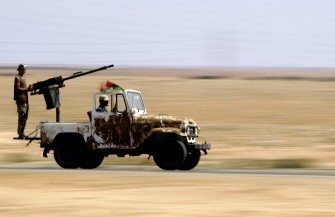The graffiti on a burnt-out building on Tripoli Street -- the main boulevard in Misrata in ruins after ferocious street fighting -- sums up the bitter mood in a city besieged for months by Moamer Kadafi's forces.
"We don't want the traitors and the people who ran away and want to come back," it says. That message echoes others scrawled around the Mediterranean port, which was a wealthy trading centre before Libya's revolution erupted in February.

The "traitors" are the people suspected of collaborating with Kadhafi's forces as they pummelled the city and who are now being hunted down and imprisoned by a 70-strong team run by the new authorities.
The ones who ran away are mostly being blocked from returning -- checkpoints ring the city and only those with special permission can enter -- until they can prove that they did not collaborate.
But even those who do make it back are subjected to scorn -- and sometimes violence -- by their fellow townspeople who stuck it out and fought back during the long months when victory was far from certain.
"This is happening too much in Misrata. Everyone is pointing the finger and saying 'He's a traitor, that one is a traitor'," said one man on Thursday outside an administrative building on Tripoli Street now used as a jail for around 600 suspected collaborators.
The man, who would not give his name, said he was at the jail to try and find out why a relative had been imprisoned.
But when he saw that a fighter loyal to the National Transitional Council (NTC) interim regime was looking at him as he spoke to an AFP correspondent, he suddenly said "I can't talk any more. There is no problem."
And he hurriedly walked away.
Another man outside the jail, who also declined to give his name, said fighters had come to his house the night before to detain his brother, a Misrata native who had been working as a doctor in Tripoli.
He had been seen some time ago on Libyan state television -- Kadhafi's propaganda channel -- being interviewed in his Tripoli hospital about casualties allegedly caused by NATO airstrikes.
He was now being investigated for alleged collaboration, but his brother insisted he had no choice but to speak to the television reporters.
Scouring old footage from the now defunct state television is one of the methods used to root out possible "traitors," explained Ibrahim al-Sherkissiya, the head of security in Misrata, whose office is in the prison.
Another technique is ploughing through Kadhafi security services' documents -- seized as anti-regime fighters slowly conquered town after town -- to find the names of Misrata people who betrayed their own.
They also mine the data seized from mobile phones found on captured Kadhafi soldiers, the security chief added. Supplying food, water, ammunition or information to Kadhafi's forces was a crime, he said.
Sherkissiya, like many townspeople here, said the stringent measures were justified because of the possibility that a "fifth column" might be operating in Misrata.
Fighting was still raging at the nearby city of Sirte, one of the Kadhafi loyalists' last hold-outs, he pointed out. And several people had recently been arrested trying to struggle hand grenades and guns into Misrata, he said.
Sherkissiya said a team of 22 lawyers and court officials and 54 fighters were assigned to find Misrata's enemy within.
They conducted proper investigations and kept their prisoners in decent conditions, allowing them visits by relatives and access to health care if needed.
"If we ascertain that a person is a traitor, we will keep him in prison until the government has a new legal system in place" and a trial can be conducted, he said. Many arrests had been made after locals denounced their neighbours, he said.
Only around 15 percent of those arrested were cleared, he said.
That means that most of those detained will not be leaving Tripoli Street for some time as the new administration in the capital struggles to rebuild the institutions of a country that for decades was treated as private property by its dictator.
Misrata was home to half a million people before the revolution and used to attract workers from across Libya as well as thousands of foreign, mainly African workers.
Nearly all of the outsiders left when the fighting began and few in this town -- which is intensely suspicious of outsiders as well as of black-skinned Libyans seen as as loyal to Kadhafi -- want them back.
Nor do many Misratans want to see the return of the natives who fled.
"If a guy ran away from Misrata and did not fight, he cannot come back," said Mohamed Rgeeg, whose family lived on Benghazi Street until their apartment was blitzed by a rocket-propelled grenade early in the siege.
The 20-year-old, his parents and siblings now live in an apartment allocated to them by the new authorities in the Ghoush district. It used to belong to a man he said was a Kadhafi loyalist.
The authorities take a less hard-line approach, saying that if their hands are clean any Misrata resident can return.
Security chief Sherkissiya warned however that for the moment returnees might not be safe: he was keeping some people in detention simply to protect them from possible attack from neighbours who saw them as traitors, he said.
Shortly after Sherkissiya spoke, an AFP reporter saw a semi-conscious young man being dragged out of a Misrata hospital and roughly dumped into the back of a pick-up truck and driven off with an armed guard.
"He is a Kadhafi kidnapper," said one man in a group of onlookers.
























